Social Psychology: Exploring Group Processes and Performance
VerifiedAdded on 2023/06/03
|5
|1241
|260
Report
AI Summary
This report delves into the realm of social psychology, specifically focusing on group processes and their impact on performance. It begins by exploring how group norms influence task performance, emphasizing the role of team leaders and the empowerment of members. The literature review examines how groups develop and change over time, highlighting different models and stages of group development. Furthermore, the report discusses the improvement of group processes, suggesting variables such as individual and group incentives, task interest, and planning. The conclusion summarizes the key concepts, including group norms, the evolution of group performance, and strategies for enhancing group processes, all of which contribute to a comprehensive understanding of group dynamics in social psychology.
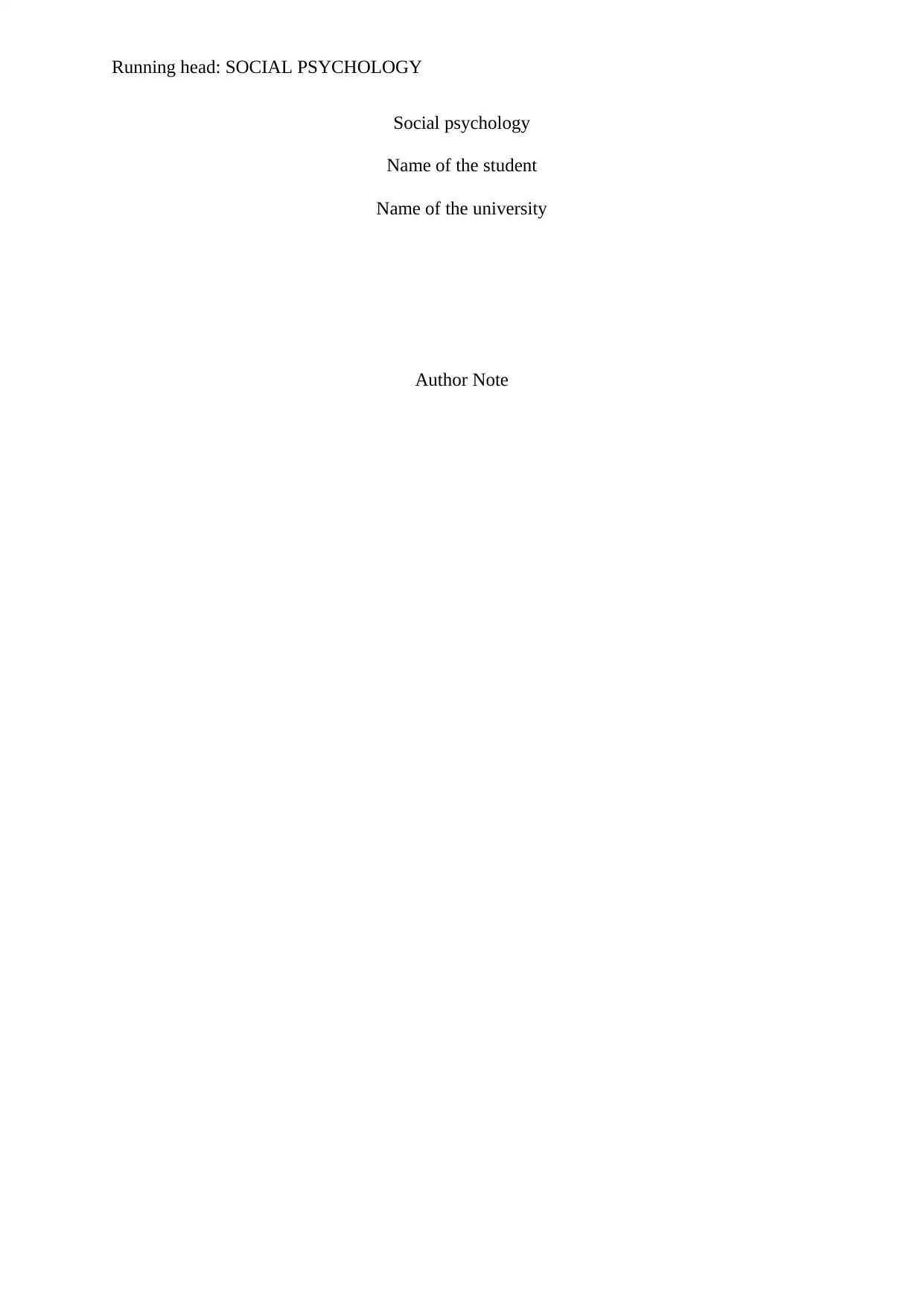
Running head: SOCIAL PSYCHOLOGY
Social psychology
Name of the student
Name of the university
Author Note
Social psychology
Name of the student
Name of the university
Author Note
Paraphrase This Document
Need a fresh take? Get an instant paraphrase of this document with our AI Paraphraser
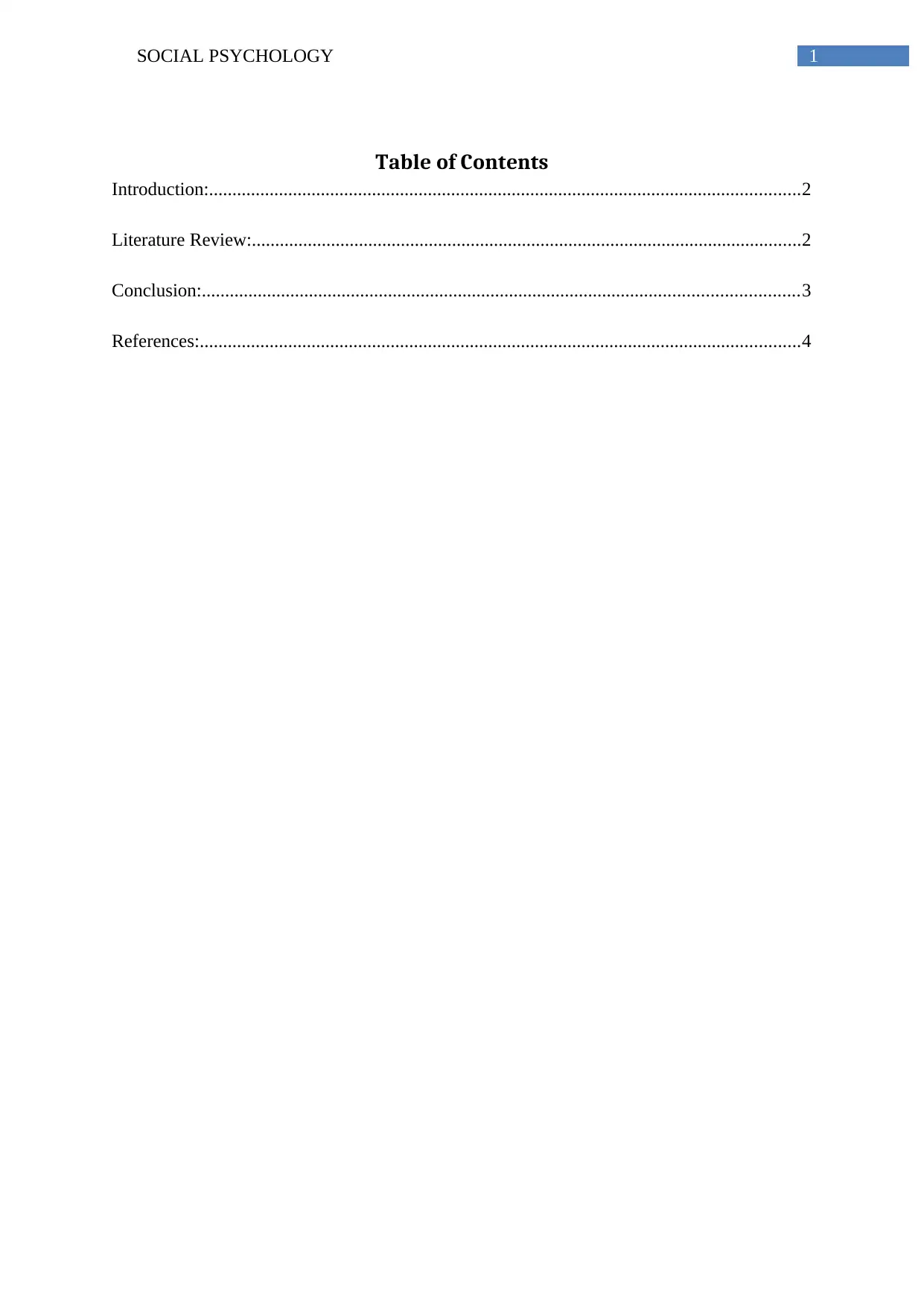
1SOCIAL PSYCHOLOGY
Table of Contents
Introduction:...............................................................................................................................2
Literature Review:......................................................................................................................2
Conclusion:................................................................................................................................3
References:.................................................................................................................................4
Table of Contents
Introduction:...............................................................................................................................2
Literature Review:......................................................................................................................2
Conclusion:................................................................................................................................3
References:.................................................................................................................................4
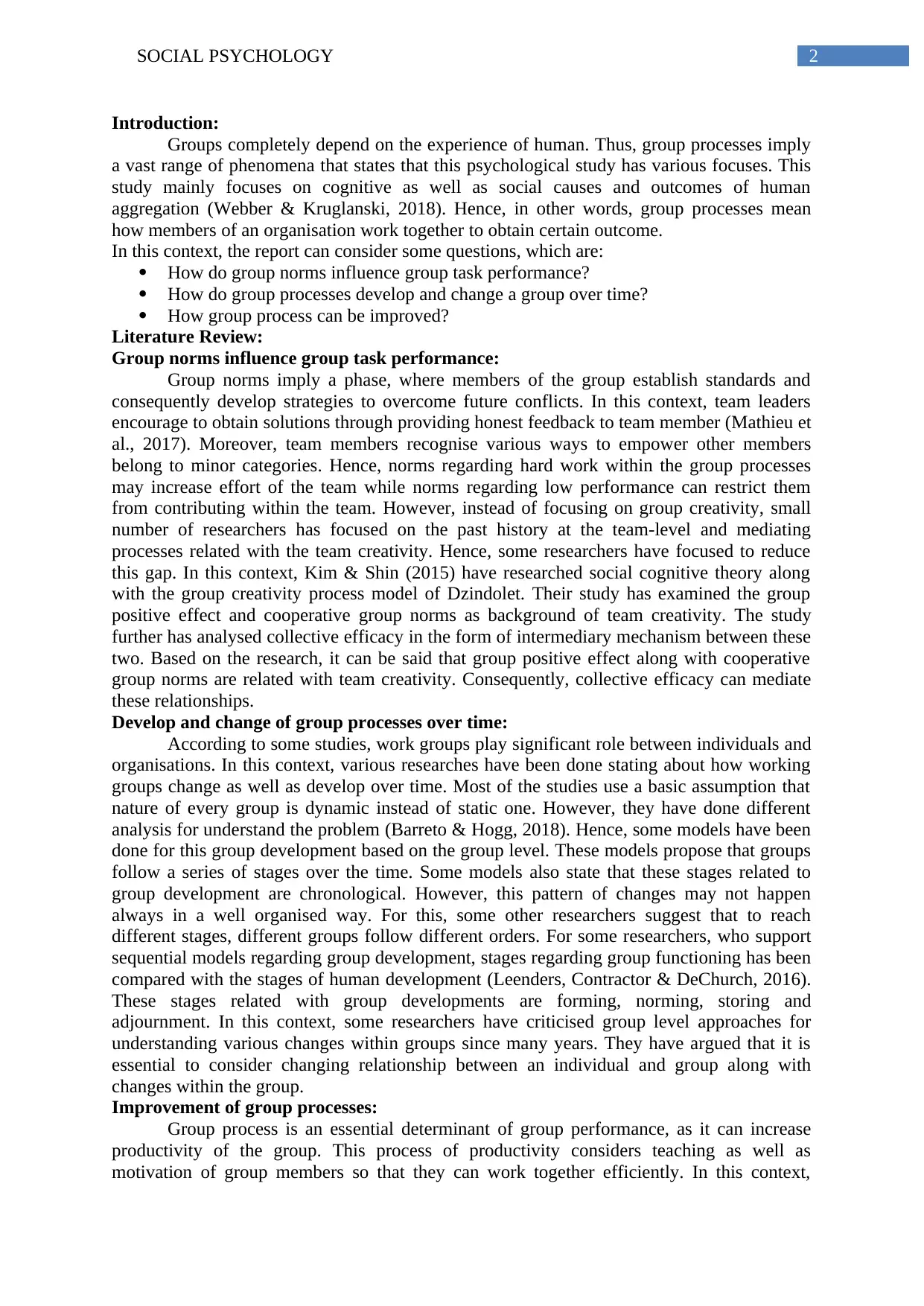
2SOCIAL PSYCHOLOGY
Introduction:
Groups completely depend on the experience of human. Thus, group processes imply
a vast range of phenomena that states that this psychological study has various focuses. This
study mainly focuses on cognitive as well as social causes and outcomes of human
aggregation (Webber & Kruglanski, 2018). Hence, in other words, group processes mean
how members of an organisation work together to obtain certain outcome.
In this context, the report can consider some questions, which are:
How do group norms influence group task performance?
How do group processes develop and change a group over time?
How group process can be improved?
Literature Review:
Group norms influence group task performance:
Group norms imply a phase, where members of the group establish standards and
consequently develop strategies to overcome future conflicts. In this context, team leaders
encourage to obtain solutions through providing honest feedback to team member (Mathieu et
al., 2017). Moreover, team members recognise various ways to empower other members
belong to minor categories. Hence, norms regarding hard work within the group processes
may increase effort of the team while norms regarding low performance can restrict them
from contributing within the team. However, instead of focusing on group creativity, small
number of researchers has focused on the past history at the team-level and mediating
processes related with the team creativity. Hence, some researchers have focused to reduce
this gap. In this context, Kim & Shin (2015) have researched social cognitive theory along
with the group creativity process model of Dzindolet. Their study has examined the group
positive effect and cooperative group norms as background of team creativity. The study
further has analysed collective efficacy in the form of intermediary mechanism between these
two. Based on the research, it can be said that group positive effect along with cooperative
group norms are related with team creativity. Consequently, collective efficacy can mediate
these relationships.
Develop and change of group processes over time:
According to some studies, work groups play significant role between individuals and
organisations. In this context, various researches have been done stating about how working
groups change as well as develop over time. Most of the studies use a basic assumption that
nature of every group is dynamic instead of static one. However, they have done different
analysis for understand the problem (Barreto & Hogg, 2018). Hence, some models have been
done for this group development based on the group level. These models propose that groups
follow a series of stages over the time. Some models also state that these stages related to
group development are chronological. However, this pattern of changes may not happen
always in a well organised way. For this, some other researchers suggest that to reach
different stages, different groups follow different orders. For some researchers, who support
sequential models regarding group development, stages regarding group functioning has been
compared with the stages of human development (Leenders, Contractor & DeChurch, 2016).
These stages related with group developments are forming, norming, storing and
adjournment. In this context, some researchers have criticised group level approaches for
understanding various changes within groups since many years. They have argued that it is
essential to consider changing relationship between an individual and group along with
changes within the group.
Improvement of group processes:
Group process is an essential determinant of group performance, as it can increase
productivity of the group. This process of productivity considers teaching as well as
motivation of group members so that they can work together efficiently. In this context,
Introduction:
Groups completely depend on the experience of human. Thus, group processes imply
a vast range of phenomena that states that this psychological study has various focuses. This
study mainly focuses on cognitive as well as social causes and outcomes of human
aggregation (Webber & Kruglanski, 2018). Hence, in other words, group processes mean
how members of an organisation work together to obtain certain outcome.
In this context, the report can consider some questions, which are:
How do group norms influence group task performance?
How do group processes develop and change a group over time?
How group process can be improved?
Literature Review:
Group norms influence group task performance:
Group norms imply a phase, where members of the group establish standards and
consequently develop strategies to overcome future conflicts. In this context, team leaders
encourage to obtain solutions through providing honest feedback to team member (Mathieu et
al., 2017). Moreover, team members recognise various ways to empower other members
belong to minor categories. Hence, norms regarding hard work within the group processes
may increase effort of the team while norms regarding low performance can restrict them
from contributing within the team. However, instead of focusing on group creativity, small
number of researchers has focused on the past history at the team-level and mediating
processes related with the team creativity. Hence, some researchers have focused to reduce
this gap. In this context, Kim & Shin (2015) have researched social cognitive theory along
with the group creativity process model of Dzindolet. Their study has examined the group
positive effect and cooperative group norms as background of team creativity. The study
further has analysed collective efficacy in the form of intermediary mechanism between these
two. Based on the research, it can be said that group positive effect along with cooperative
group norms are related with team creativity. Consequently, collective efficacy can mediate
these relationships.
Develop and change of group processes over time:
According to some studies, work groups play significant role between individuals and
organisations. In this context, various researches have been done stating about how working
groups change as well as develop over time. Most of the studies use a basic assumption that
nature of every group is dynamic instead of static one. However, they have done different
analysis for understand the problem (Barreto & Hogg, 2018). Hence, some models have been
done for this group development based on the group level. These models propose that groups
follow a series of stages over the time. Some models also state that these stages related to
group development are chronological. However, this pattern of changes may not happen
always in a well organised way. For this, some other researchers suggest that to reach
different stages, different groups follow different orders. For some researchers, who support
sequential models regarding group development, stages regarding group functioning has been
compared with the stages of human development (Leenders, Contractor & DeChurch, 2016).
These stages related with group developments are forming, norming, storing and
adjournment. In this context, some researchers have criticised group level approaches for
understanding various changes within groups since many years. They have argued that it is
essential to consider changing relationship between an individual and group along with
changes within the group.
Improvement of group processes:
Group process is an essential determinant of group performance, as it can increase
productivity of the group. This process of productivity considers teaching as well as
motivation of group members so that they can work together efficiently. In this context,
⊘ This is a preview!⊘
Do you want full access?
Subscribe today to unlock all pages.

Trusted by 1+ million students worldwide
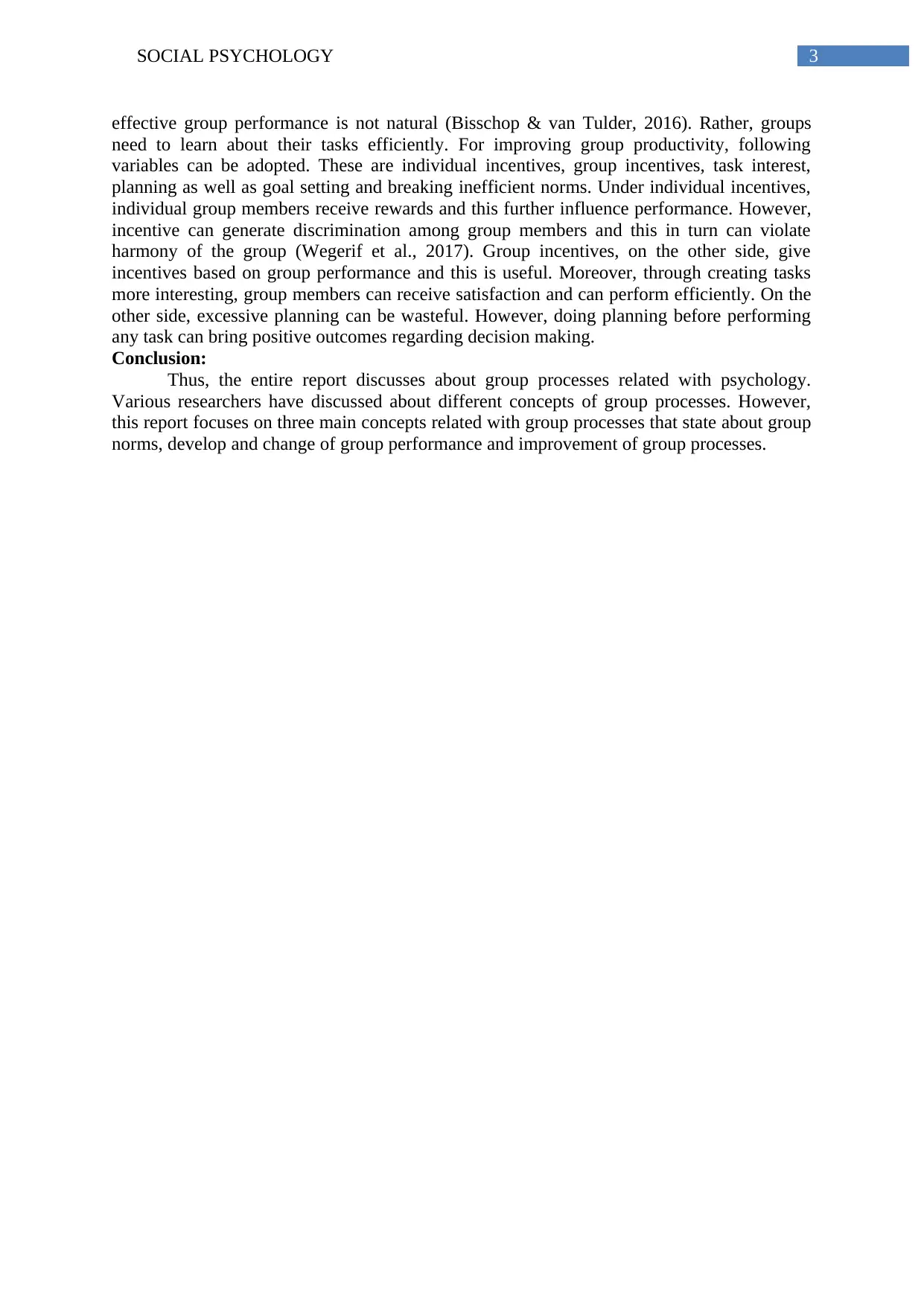
3SOCIAL PSYCHOLOGY
effective group performance is not natural (Bisschop & van Tulder, 2016). Rather, groups
need to learn about their tasks efficiently. For improving group productivity, following
variables can be adopted. These are individual incentives, group incentives, task interest,
planning as well as goal setting and breaking inefficient norms. Under individual incentives,
individual group members receive rewards and this further influence performance. However,
incentive can generate discrimination among group members and this in turn can violate
harmony of the group (Wegerif et al., 2017). Group incentives, on the other side, give
incentives based on group performance and this is useful. Moreover, through creating tasks
more interesting, group members can receive satisfaction and can perform efficiently. On the
other side, excessive planning can be wasteful. However, doing planning before performing
any task can bring positive outcomes regarding decision making.
Conclusion:
Thus, the entire report discusses about group processes related with psychology.
Various researchers have discussed about different concepts of group processes. However,
this report focuses on three main concepts related with group processes that state about group
norms, develop and change of group performance and improvement of group processes.
effective group performance is not natural (Bisschop & van Tulder, 2016). Rather, groups
need to learn about their tasks efficiently. For improving group productivity, following
variables can be adopted. These are individual incentives, group incentives, task interest,
planning as well as goal setting and breaking inefficient norms. Under individual incentives,
individual group members receive rewards and this further influence performance. However,
incentive can generate discrimination among group members and this in turn can violate
harmony of the group (Wegerif et al., 2017). Group incentives, on the other side, give
incentives based on group performance and this is useful. Moreover, through creating tasks
more interesting, group members can receive satisfaction and can perform efficiently. On the
other side, excessive planning can be wasteful. However, doing planning before performing
any task can bring positive outcomes regarding decision making.
Conclusion:
Thus, the entire report discusses about group processes related with psychology.
Various researchers have discussed about different concepts of group processes. However,
this report focuses on three main concepts related with group processes that state about group
norms, develop and change of group performance and improvement of group processes.
Paraphrase This Document
Need a fresh take? Get an instant paraphrase of this document with our AI Paraphraser
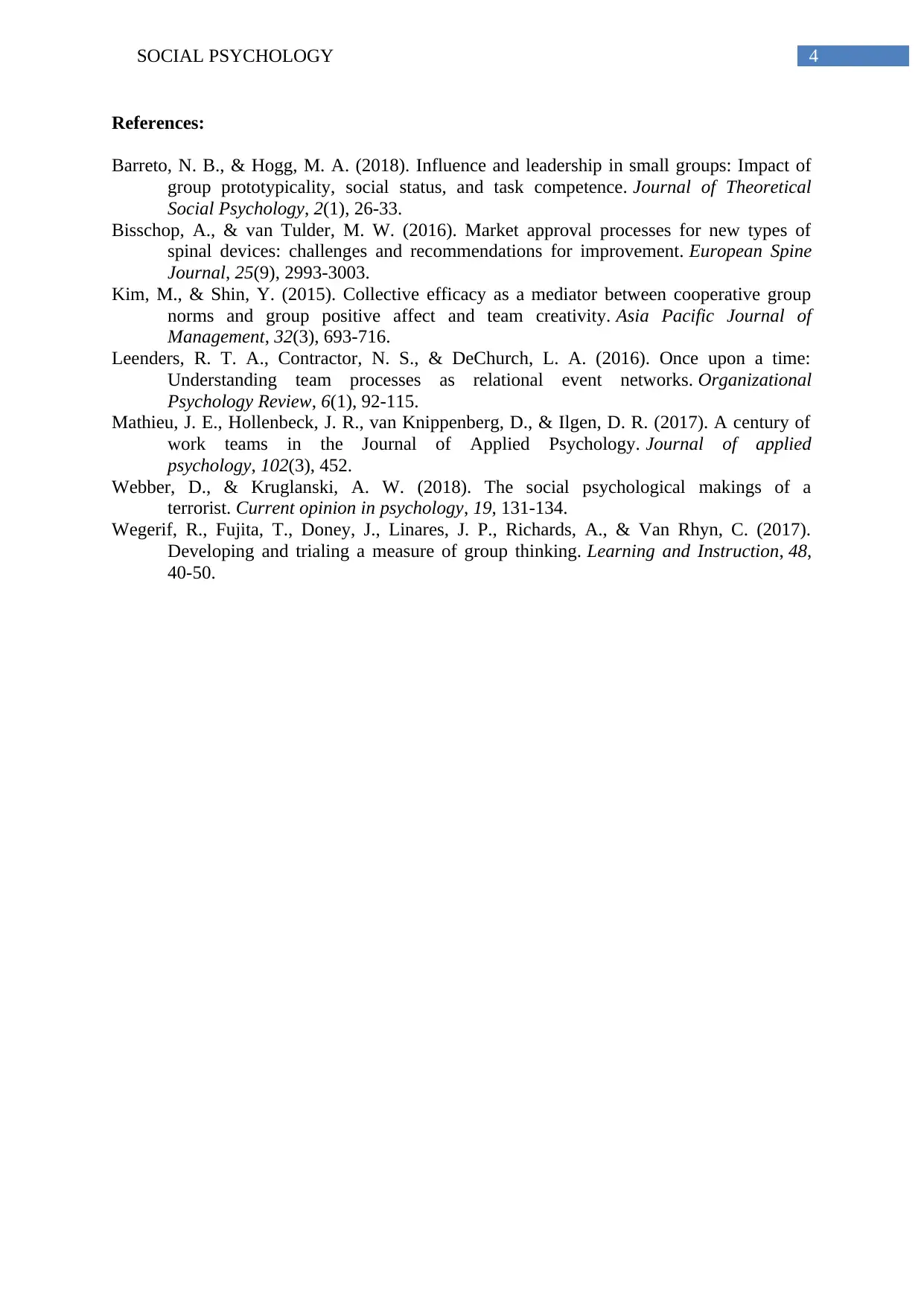
4SOCIAL PSYCHOLOGY
References:
Barreto, N. B., & Hogg, M. A. (2018). Influence and leadership in small groups: Impact of
group prototypicality, social status, and task competence. Journal of Theoretical
Social Psychology, 2(1), 26-33.
Bisschop, A., & van Tulder, M. W. (2016). Market approval processes for new types of
spinal devices: challenges and recommendations for improvement. European Spine
Journal, 25(9), 2993-3003.
Kim, M., & Shin, Y. (2015). Collective efficacy as a mediator between cooperative group
norms and group positive affect and team creativity. Asia Pacific Journal of
Management, 32(3), 693-716.
Leenders, R. T. A., Contractor, N. S., & DeChurch, L. A. (2016). Once upon a time:
Understanding team processes as relational event networks. Organizational
Psychology Review, 6(1), 92-115.
Mathieu, J. E., Hollenbeck, J. R., van Knippenberg, D., & Ilgen, D. R. (2017). A century of
work teams in the Journal of Applied Psychology. Journal of applied
psychology, 102(3), 452.
Webber, D., & Kruglanski, A. W. (2018). The social psychological makings of a
terrorist. Current opinion in psychology, 19, 131-134.
Wegerif, R., Fujita, T., Doney, J., Linares, J. P., Richards, A., & Van Rhyn, C. (2017).
Developing and trialing a measure of group thinking. Learning and Instruction, 48,
40-50.
References:
Barreto, N. B., & Hogg, M. A. (2018). Influence and leadership in small groups: Impact of
group prototypicality, social status, and task competence. Journal of Theoretical
Social Psychology, 2(1), 26-33.
Bisschop, A., & van Tulder, M. W. (2016). Market approval processes for new types of
spinal devices: challenges and recommendations for improvement. European Spine
Journal, 25(9), 2993-3003.
Kim, M., & Shin, Y. (2015). Collective efficacy as a mediator between cooperative group
norms and group positive affect and team creativity. Asia Pacific Journal of
Management, 32(3), 693-716.
Leenders, R. T. A., Contractor, N. S., & DeChurch, L. A. (2016). Once upon a time:
Understanding team processes as relational event networks. Organizational
Psychology Review, 6(1), 92-115.
Mathieu, J. E., Hollenbeck, J. R., van Knippenberg, D., & Ilgen, D. R. (2017). A century of
work teams in the Journal of Applied Psychology. Journal of applied
psychology, 102(3), 452.
Webber, D., & Kruglanski, A. W. (2018). The social psychological makings of a
terrorist. Current opinion in psychology, 19, 131-134.
Wegerif, R., Fujita, T., Doney, J., Linares, J. P., Richards, A., & Van Rhyn, C. (2017).
Developing and trialing a measure of group thinking. Learning and Instruction, 48,
40-50.
1 out of 5
Related Documents
Your All-in-One AI-Powered Toolkit for Academic Success.
+13062052269
info@desklib.com
Available 24*7 on WhatsApp / Email
![[object Object]](/_next/static/media/star-bottom.7253800d.svg)
Unlock your academic potential
Copyright © 2020–2026 A2Z Services. All Rights Reserved. Developed and managed by ZUCOL.





